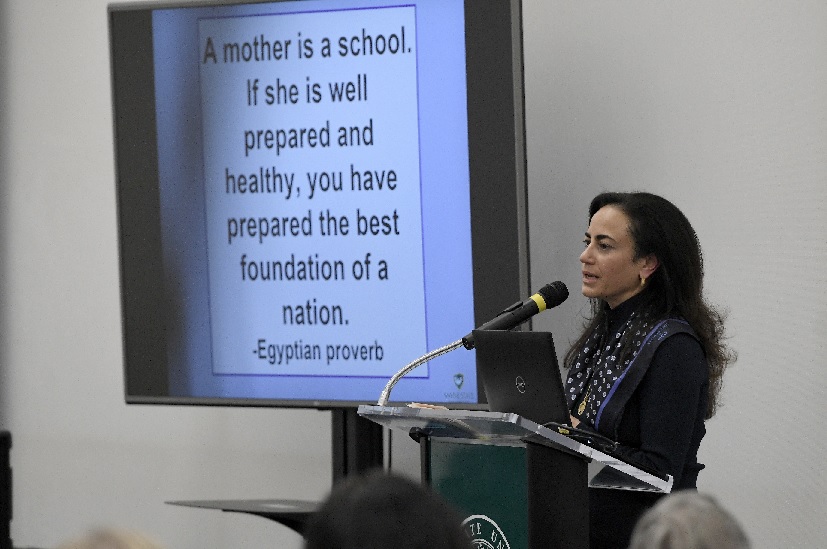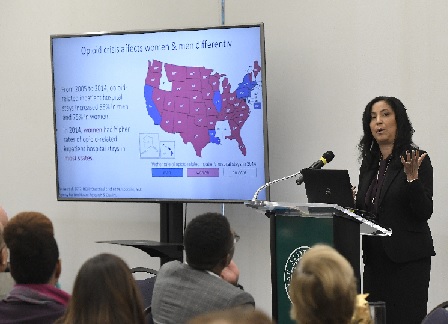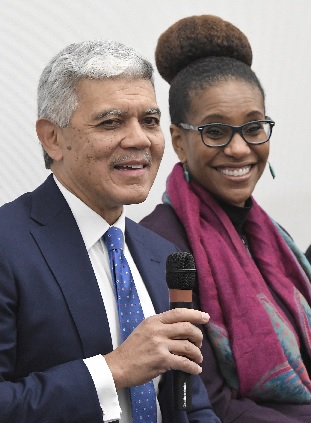
Wayne State University launched its new Office of Women’s Health, a comprehensive approach to improve the health of women overall, through a deep dive into medical research affecting more than half the population of Michigan and the nation, a segment often unintentionally overlooked in research.
The Office of Women’s Health marked its official debut with an inaugural symposium Dec. 3 at the university’s

McGregor Conference Center that brought together more than 130 researchers from across the university, community and grassroots partnering organizations, and a keynote address from Janine Clayton, M.D. Dr. Clayton, the National Institutes of Health’s associate director for Research on Women's Health and director of the NIH Office of Research on Women's Health, delivered the address, “Putting Women at Center Stage in Biomedical Research,” the very purpose of the new WSU office.
“We have the resources and a wonderful research culture at the university,” WSU President M. Roy Wilson told the attendees. “That, coupled with our concentration on health equity, means we can come together with a focused effort on women’s health.”
“Collaboration across the entire university and partnerships with community organizations, will be keys to the office’s

approach,” said Sonia Hassan, M.D., associate vice president and founder of the Office of Women’s Health and a professor of Obstetrics and Gynecology.
“We will employ a trans-disciplinary approach to women’s health throughout the university,” Dr. Hassan said. “The office also will collaborate with external stakeholders to play an overarching role toward transforming health care for women and their children, creating healthier families.”
The office, she said, will work to improve the health of women to maximize the opportunity for families to thrive and achieve economic security. It will empower all women to lead their healthiest lives through all stages of life by implementing five core pillars: education outreach, research and development, the implementation of science, working to place more women in scientific research and helping to develop policy.
Considering facts presented by panelists during the symposium, there is a clear need for increased research into women’s health:
• The mortality rate among American women ages 25 to 34 has increased by 26.3% since 2010.
• The preterm birth rate of African American women in the United States is 49% higher than other women.
• Heart disease is the leading killer of women. More women die from heart disease and stroke than all cancers combined.
• One in eight women in the U.S. will develop breast cancer.
• Neurocognitive diseases are one and one-half to three times more prevalent among women.
• From 2005 to 2014, opioid-related inpatient hospital stays increased 55% in men, but 75% in women. In 2014, women had higher rates of opioid-related inpatient hospital stays in most states.
• Women 50 to 65 with hypertension and hyperlipidemia were the leading cost segment in the health system of Americans with two diseases. Women 50 to 65 with hypertension, osteoarthritis and high cholesterol were the leading combination of three conditions in terms of prevalence and cost.
• Women are more likely than men to contract HIV, die from heart disease, suffer from malnutrition and face severe complications from diabetes.
• Health is worse among urban women. Nationally, 42% of the population lives with two or more chronic health conditions, and among those living in urban areas, the rate jumps to 61.5%.
• Eighty percent of health and health economic decisions in households are made by women, and those decisions affect all family members.
Compounding these issues, Dr. Hassan noted, are social determinants of health, such as poverty, neglect, malnutrition, pollution, racism, crime, and more, leading to increased levels of stress that generate detrimental effects, creating and exacerbating chronic health conditions. Those stressors are likely higher among women in Michigan, where mothers are the sole, primary or co-breadwinners in 63% of families. The numbers are even higher for women of color.
Dr. Hassan previously served as the lead faculty member at WSU in its relationship with the National Institutes of Health’s Perinatology Research Branch of the Eunice Kennedy Shriver National Institute of Child Health and Human Development for 13 years, and led a study demonstrating that the use of progesterone in women with a shortened cervix decreases the rate of preterm birth before 33 weeks of gestation by 45 percent. She pointed to an Egyptian proverb often quoted by her mother: “A mother is a school. If she is well prepared and healthy, you have prepared the best foundation of a nation.”
For additional information about the Wayne State University Office of Women’s Health, call 313-577-3526 or email womenshealth@wayne.edu.